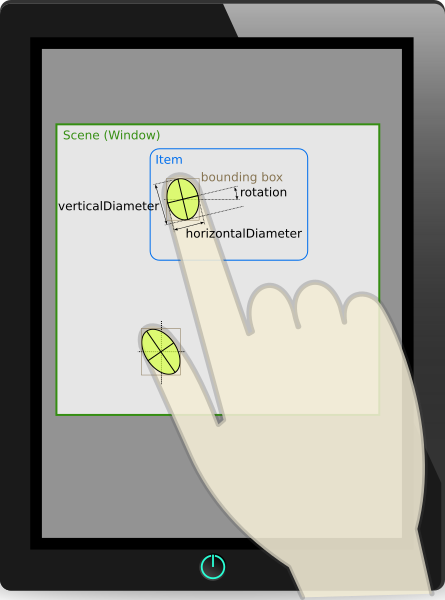TouchPoint QML Type
Describes a touch point in a MultiPointTouchArea. More...
| Import Statement: | import QtQuick 2.13 |
Properties
- ellipseDiameters : size
- pointId : int
- pressed : bool
- pressure : real
- previousX : real
- previousY : real
- rotation : real
- sceneX : real
- sceneY : real
- startX : real
- startY : real
- uniqueId : PointingDeviceUniqueId
- velocity : vector2d
- x : real
- y : real
Detailed Description
The TouchPoint type contains information about a touch point, such as the current position, pressure, and area.

Property Documentation
These properties hold the current position of the touch point in scene coordinates.
These properties hold additional information about the current state of the touch point.
pressureis a value in the range of 0.0 to 1.0.velocityis a vector with magnitude reported in pixels per second.
Not all touch devices support velocity. If velocity is not supported, it will be reported as 0,0.
ellipseDiameters : size |
This property holds the major and minor axes of the ellipse representing the covered area of the touch point.
This property was introduced in Qt 5.9.
pointId : int |
This property holds the point id of the touch point.
Each touch point within a MultiPointTouchArea will have a unique id.
pressed : bool |
This property holds whether the touch point is currently pressed.
rotation : real |
This property holds the angular orientation of this touch point. The return value is in degrees, where zero (the default) indicates the finger or token is pointing upwards, a negative angle means it's rotated to the left, and a positive angle means it's rotated to the right. Most touchscreens do not detect rotation, so zero is the most common value.
This property was introduced in Qt 5.9.
See also QTouchEvent::TouchPoint::rotation().
This property holds the unique ID of the touch point or token.
It is normally empty, because touchscreens cannot uniquely identify fingers. But when it is set, it is expected to uniquely identify a specific token (fiducial object).
Interpreting the contents of this ID requires knowledge of the hardware and drivers in use (e.g. various TUIO-based touch surfaces).
This property was introduced in Qt 5.9.
© 2019 The Qt Company Ltd. Documentation contributions included herein are the copyrights of their respective owners. The documentation provided herein is licensed under the terms of the GNU Free Documentation License version 1.3 as published by the Free Software Foundation. Qt and respective logos are trademarks of The Qt Company Ltd. in Finland and/or other countries worldwide. All other trademarks are property of their respective owners.
